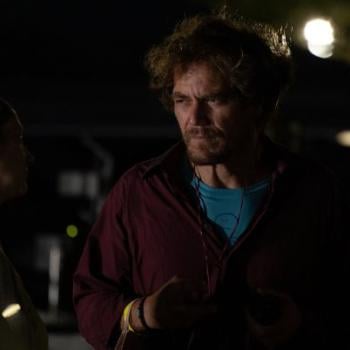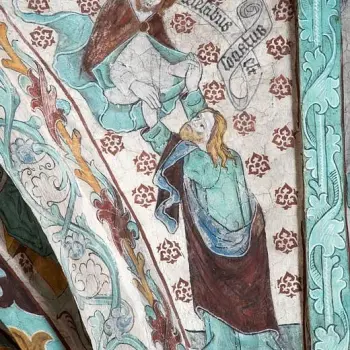Mozart's Don Giovanni concludes with one of the most spellbinding scenes ever to occupy the Western stage. The lecherous Don, in the presence of an appalling personification of Death, swings wildly between defiant bravado and abject terror as he faces an eternity of suffering for his sins. Giovanni takes the hand of Death, hellish specters fly up from the deep, and the sinner is flung to his fiery fate. The moral of the story is clear: never, ever invite the statue to dinner.
If the opera is a straight-up morality tale in which an unrepentant sinner is justly punished for his deeds, why is the climactic scene followed by a short comic re-cap of the events? The remaining characters gather onstage to make jokes and romantic pairings, more like something you'd see at the end of a Shakespeare comedy than at the end of a dark tragedy of sin and death. It doesn't seem to fit the mood or the theme of the opera, and indeed the scene is often cut from staged productions of Don Giovanni.
So why did Mozart and his librettist Da Ponte choose to finish on this strangely upbeat note?
One way to make sense of the finale is to suggest that Don Giovanni is indeed a comedy, and that Giovanni's horrible fate is in fact a happy ending. But in what possible scenario could an eternity of pain represent a happy end? Perhaps suffering is a kind of deliverance only if the alternative is an eternity of utter oblivion, a complete extinction of the self.
In the first act of the opera, Don Giovanni pursues his sexual pleasure not only with a grim joylessness but with a strange absence of personality: Kierkegaard described him as "characterless," and other critics note Giovanni's weightlessness or depthlessness. Giovanni is not so much a character, a subject in himself, as an idea. He is given no proper aria, and as with a Shakespeare character denied his soliloquy, Giovanni develops no proper self.
His relentless pursuit of sex thus can never be a quest for the affirmation of self in a genuine encounter with another human being. For Giovanni, as for Freud, sex is an intimation of death, where death is understood as a final end to the subject: in Othello's perfect words, "Put out the light, and then put out the light." For Giovanni, each conquest is a little death, a moment of annihilation as horrifying as it is compelling.
Giovanni's final encounter with the Commendatore, then, can be understood as the encounter of two worldviews: in Giovanni, the view that there is no self-after-death because there is no soul, only a cold godless universe tilting swiftly into chaos; in the Commendatore, the view that the conscious soul persists beyond death, its consciousness and its persistence guaranteed by the hammer of God's terrible justice.
In Mozart's playful way, Don Giovanni rejects Don Giovanni and instead affirms the Commendatore's universe. And if you buy my argument above, this is the happy ending. Suffering is terrible, yes, but if it is terrible it implies a self capable of feeling—and that, my friends, is very good news, given the alternative.
Don Giovanni thus asks the musical question: which would you rather have, eternal suffering or eternal oblivion? It's not a crux that many moderns encounter in an existential way. Fewer Christians accept the idea of eternal suffering as a genuine possibility, for one thing: Rob Bell has brought universal salvation into the mainstream of evangelical teaching, for instance, and a version of universal salvation structures the soteriology of my own Mormon tradition. So while Christians might hesitate between the prospects of universal and conditional salvation, and agnostics might hesitate between the possibilities of eternal soul and natural organism, neither of these dilemmas really has existential teeth: the eternal bliss of universal salvation offers an obvious happy way out. Out of the frying pan and into—a blessed realm where there is no sin, no sadness, no suffering, and certainly neither Don Giovanni nor Don Giovanni.
And this is all to the good, I suppose. Only someone really, really dedicated to their existential angst—guilty as charged, here—would reject the possibility of a loving God and universal salvation as insufficiently aesthetic. But still, I can't help feeling that it is only in the frying-pan-fire world of Don Giovanni that the Commendatore's low D can both ice the veins and ignite the fires of hell. To him I say, Sing on, sir. It's cold in here.
7/13/2011 4:00:00 AM





